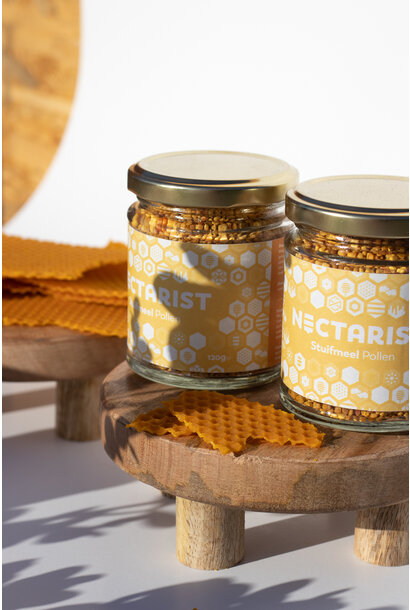
Pollen
Bee pollen is a source of vitamins, proteins, minerals and fats. Pollen is an ideal dietary supplement and is considered a superfood.

Bee pollen is a source of vitamins, proteins, minerals and fats. Pollen is an ideal dietary supplement and is considered a superfood.
 FavoritenAdd to cart
FavoritenAdd to cart€ 7,90 Incl. tax
Bee pollen is a source of vitamins, proteins, minerals and fats. Pollen is an ideal dietary supplement and is considered a superfood.
What is pollen?
Pollen is a raw material coming from the male germ cells of the flower. During their search for food, the buzzing bees collect not only nectar, but also pollen. After adding enzymes, the mixture is ready to be easily transported in tiny balls on the bee’s hind legs. Once arrived at the hive, the bee rubs the clumps out of her legs and into one of the cells.
How is bee pollen used?
Bees consider it to be exceptionally nutritious food. How about humans? Well, small quantities of pollen grains are your one-stop all-natural dietary supplement! Pollen is a source of energy due to its high content of carbohydrates and proteins. The pollen is also packed with vitamins, minerals, proteins, antioxidants, fatty acids and amino acids. Hello superfood!
The vitamins contained in the bee pollen help to achieve an increased energy level. No wonder, because there are many: A, B1, B2, B3, B6, B8, B9, B12, C, D, E, K and iron, barium, boron, calcium, copper, gold, iodine, magnesium, phosphorus, potassium, selenium, silicon, sulphur, sodium, zinc, molybdenum and manganese.
Bee pollen demonstrates a series of health benefits such as antifungal, antiviral and anti-inflammatory effects.
The wide range of nutrients in bee pollen provide improved body resistance and a faster recovery of damaged body cells. Just like propolis and royal jelly, pollen boosts your (winter) immune system and mental capacity.
Hay fever
Are you one of the ‘lucky’ ones to suffer from runny noses, the constant urge to sneeze and itchy eyes as soon as the hay fever season hits planet Earth? Then bee pollen grains can be your salvation! The occurrence of these unpleasant symptoms are your immune system’s response to the numerous pollen grains floating through the air every spring. Your immune system releases too much histamine, while our Nectarist pollen grains contains quercetin, which functions as a natural antihistamine to significantly reduce your symptoms.
How to use bee pollen?
Take 1 spoonful of pollen grains a day. Consume the pollen grains without a supplement or mix them with yogurt, a smoothie or salad if the taste doesn’t please you.
How does the beekeeper harvest its pollen grains?
Beekeepers use a pollen trap to harvest the bee pollen. The beekeepers position the pollen trap at the flight opening of the hive or apiary so the bees can no longer fit their clumps of pollen through that opening.
Harvesting pollen, like honey, happens to a limited extent. The bee pollen are an important food source for bees and is therefore only removed when there is certainly enough left for the bees themselves.